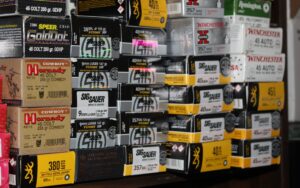
By Dave Workman
Editor-in-Chief
A federal district court judge in California has issued a permanent injunction against enforcement of the state’s ammunition background check law, in a ruling almost certain to be appealed.
U.S. District Court Judge Roger T. Benitez in San Diego handed down the 32-page decision, declaring, “The ammunition background checks laws have no historical pedigree and operate in such a way that they violate the Second Amendment right of citizens to keep and bear arms.”
He ordered California Attorney General Rob Bonta to “provide forthwith, by personal service or otherwise, actual notice of this order to all law enforcement personnel who are responsible for implementing or enforcing the enjoined statutes.”
The case is known as Rhode v. Bonta (originally filed in 2018 as Rhode v. Becerra). It was brought by the California Rifle & Pistol Association (CRPA), several firearm and ammunition dealers and seven Golden State residents including Olympic gold medalist Kim Rhode, for whom the case is named.
CRPA President and General Counsel Chuck Michel declared in a prepared statement, “Today’s ruling represents continued affirmation that the Bruen decision, and Heller before that, represent a sea change in the way courts must look at these absurdly restrictive laws. Sure, the state will appeal, but the clock is ticking on laws that violate the Constitution.”
In his ruling, Judge Benitez observes, “The Attorney General has pointed to no other laws in the nation that erect a similar barrier to this one, keeping away out-of-state ammunition sellers and guaranteeing all sales originate with, or flow through, only in-state ammunition sellers. It is precisely such purposeful discrimination that lies at the core of the Supreme Court’s dormant Commerce Clause concerns.”
California has some of the most restrictive gun control laws in the country. The ammunition background check statute has quite a history, as detailed in the Benitez ruling. It was born in a citizen initiative approved by voters in 2016 as Proposition 63. Virtually every gun rights organization in the country opposed it.
However, as noted by Benitez, before election day the state legislature enacted Senate Bill 1235, which amended tenets of Prop 63. “Instead of creating a system using an ammunition purchase permit that was valid for four years, Senate Bill 1235 requires residents to submit to an automated background check every time they need to buy ammunition,” the opinion recalls.
“When a person chooses to buy a firearm,” Judge Benitez observed, “he is required to undergo a full background check. However, until now, he was not required to also go through a background check every time he needs to refill his gun with ammunition. And the Bill of Rights commands that the right to keep and bear arms shall not be infringed. With the recently enacted ammunition background check laws, gun owners in California undergo background checks more than one million times each year simply to buy ammunition. They are not allowed to buy ammunition from out-of-state vendors and have it delivered to their homes. They are not allowed to buy ammunition in Arizona or Nevada and bring it with them back into California. Though they are citizens entitled to enjoy all of the constitutional rights, Californians are denied the Second Amendment right to buy ammunition for self-defense at least 11% of the time because of problems with the background check system.”
Elsewhere, the judge explains, “Because ammunition sale prohibitions and regulations are covered by the Second Amendment, the presumption is that such restrictions are infringements. The State may overcome the presumption, but it needs to do so as Bruen teaches. In other words, ‘the government must demonstrate that the regulation is consistent with this Nation’s historical tradition of firearm regulation.’”
Later, Benitez includes an observation sure to make liberal blood boil: “The Fifteenth Amendment directs that the right to vote shall not be denied or abridged. A state law requiring identification before voting, where 4.5% of all voters lacked the requisite identification documents to vote, was struck down because the excessive burden abridged the constitutional right, and more specifically for violating the Voting Rights Act (legislation that flows from the Fifteenth Amendment). If a state identification requirement for voting which burdens 4.5% of registered voters is an unconstitutional burden on the Fifteenth Amendment, surely a state identification requirement that blocks an untold number of gun owners from undergoing an ammunition background check and then rejects 11% of those who are checked, is likewise an unconstitutional burden on the Second Amendment.”



